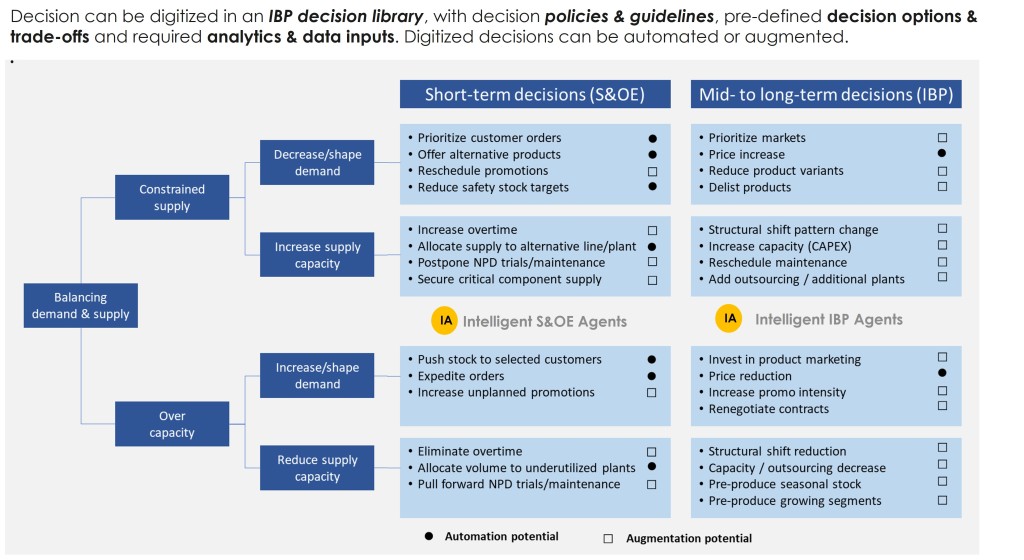Many Integrated Business Planning (IBP) cycles around the world are based on a 30-year-old process definition supported by similarly aged planning concepts. This traditional IBP is often not sufficient anymore for a fast-changing world, where speed of decision making and taking the right action means competitive advantage.
Well run, traditional IBP can have many positive outcomes, but there are also many limitations like sequential process steps, arbitrary periodic planning & decision cycles, excessive (pre)meetings, lack of strategy integration, cumbersome data management, analytics waste, and not the least, an information focus rather than a decision focus.
Although IBP is designed to make high-impact business decisions, little attention has been given to the quality and speed of decisions in an IBP cycle. On top of this, IBP stakeholders don’t effectively manage their decision bias, capture decisions, or learn from the decisions they make. This lack of decision centricity in IBP can be addressed by Decision Intelligence.
Rethinking IBP with Decision Intelligence
Decision Intelligence (DI) manages the data-to-action process, and uses both human and machine intelligence to augment and automate decisions, align decision makers and reduce decision bias. Planning decisions can be segmented by highly automated S&OE where the human is mostly out-of-the-loop, and augmented IBP decisions, where the human is in—the-loop. Gartner estimates that 65% of short-term supply chain decisions can be autonomous by 2026.
Although IBP decisions are less frequent than S&OE decisions, similar IBP decisions often return during IBP cycles. As below, 10-year-old schematic from a global beverage company shows, a long-term projected demand & supply imbalance triggers a limited set of possible IBP decisions to find a solution. These decisions can be digitized in a decision tree, and augmented by an intelligent agent that understands its environment, detects issues that require a decision, analyze the possible options, recommends the best solutions or acts autonomously under certain thresholds, whilst learning from decisions and actions.

The deployment of intelligent agents to augment IBP decisions is not limited to long term demand and supply balancing. They can be applied to the decision scope of every meeting in the IBP cycle and support sourcing decisions, product portfolio decisions, price, margin or promotional decisions, gap closure decisions and risk & opportunity decisions.
A need for decision centric technology
The average planner and IBP manager will understand that the Enterprise Resource Planning (ERP) and Advanced Planning and Scheduling (APS) technologies they are often working with cannot provide these decision capabilities. ERP systems are often referred to as a “system of record” for enterprise data, as they hold a history of all master and transactional data. An APS system can be considered a system of record for schedules, plans and planning assumptions. Although both ERP and APS systems support planners to facilitate decisions, they are solely focused on the inputs like data, analysis, insight, forecast, plans, or scenarios – not on the decision itself.
Decision intelligence technology is focused on the decision. It can orchestrate decision making as a measurable data-to-action business process. All IBP decisions supported by decision intelligence technology are digitized and the decision context is captured. This creates a system of record for decisions, where the decision itself, the steps, decision maker, the value, the impact, are all data points that can be analyzed, monitored, and learned from.
In the context of IBP, this means that open, pending, and closed IBP decisions are digitized and can be visualized, analyzed, and monitored in an IBP decision control room. This provides an IBP manager, or senior IBP stakeholders, with a continuous digitized view of outstanding decisions, gaps to plan, risks & opportunities. These new decision-centric IBP capabilities will require an update in traditional planning operating models and ways of working.
A changing role for the IBP manager
New decision centric roles like supply chain decision intelligence manager, or lead decision architect, are already emerging in leading companies. Decision centricity for an IBP manager will mean that, once the IBP decisions are digitized, the focus will shift from discussing planning outcomes to facilitating decision streams, improve decision velocity, quality, and decision knowledge & learning.
The IBP manager can continuously check planning gaps & outstanding decisions in a IBP control room to understand unresolved decisions. By simply sorting the IBP decision log by function, value impact, likelihood of success or other criticality criteria, the IBP manager can choose decisions that need to be made with most urgency and escalate these to the leadership team. Rather than waiting for the IBP cycle, the IBP manager can facilitate on-demand IBP decisions, increasing decision velocity.
When a company changes its strategic direction, the digitized IBP decisions and the supporting intelligent agents might require maintenance to realign with the strategy. It becomes the role of the IBP manager to facilitate updated assumptions, decision policies, decision goals and targets across functions. Decision boundaries, as well automation and augmentation thresholds for the intelligent agents might need cross functional renegotiation. After facilitating these updates, the IBP manager can maintain IBP the agents in the IBP decision control room to ensure digitized decision making stays aligned with the company strategy.
Decision Centric IBP
Although executive decision-making forums like IBP lack a focus on advanced decisions making practices, decision centric IBP and in general a decision centric enterprise, is fast becoming a necessity. Besides the need for Decision Intelligence technology, it requires a new way of thinking and working for companies and the IBP manager.
Applying decision intelligence to IBP decisions is a new evolution in IBP that will result in faster, higher quality decisions, with less time in meetings, reduced analytics waste, more employee engagement with the decision process, a learning enterprise, and a continuous alignment with the company strategy. It will create true decision centric IBP.

